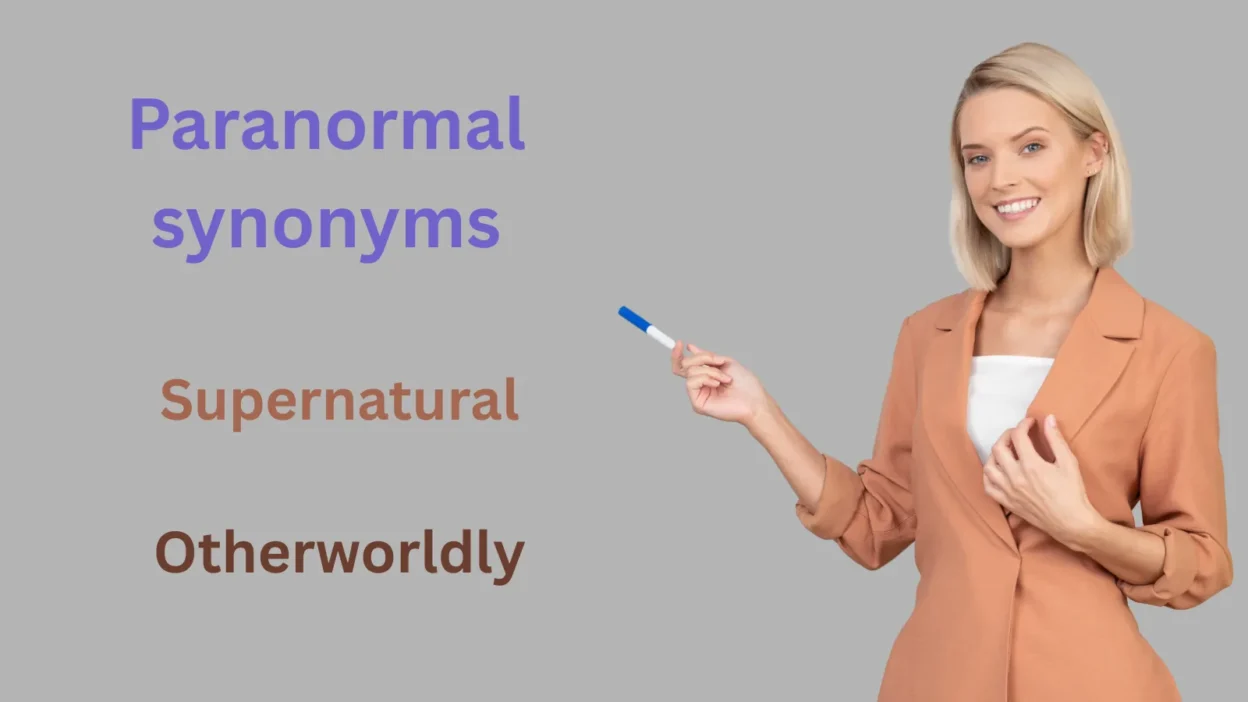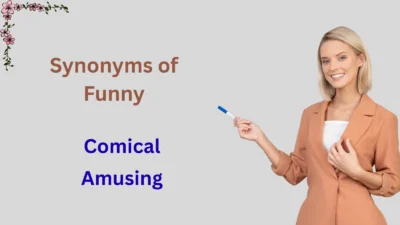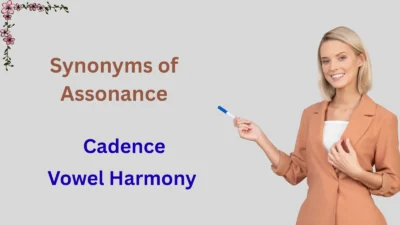Paranormal synonyms describe things that go beyond normal human experience—like supernatural, mystical, or otherworldly. These words capture strange events, ghostly presences, and unexplained forces that science can’t easily define.
Writers, filmmakers, and storytellers often use these terms to create mystery, suspense, or spiritual depth. Each synonym for paranormal adds its own shade of meaning—some sound eerie and dark, while others feel magical or divine.
In this article, we’ll explore powerful alternatives for paranormal, explain their meanings, and show examples of how to use them in writing or conversation.
What Does Paranormal Mean?
Paranormal refers to events, experiences, or phenomena that go beyond what science can easily explain. It often involves the supernatural, mystical, or unseen forces that challenge our understanding of reality.
The term is commonly used in stories, movies, and real-life accounts involving mysterious or ghostly occurrences.
Paranormal phenomena are often associated with:
- Haunted places where strange sounds or sightings occur
- Psychic abilities like telepathy or clairvoyance
- Ghostly encounters and spiritual manifestations
- Unexplained events that defy logic or science
It’s not just about ghosts or magic — the paranormal represents the thrilling boundary between what we know and what we can’t yet explain, blending mystery, wonder, and fear into one fascinating idea.
Synonyms & Related Words for Paranormal synonyms
1. Supernatural
Description: Existing beyond or defying natural laws; often tied to divine or ghostly forces.
Example: “The villagers believed a supernatural presence haunted the old well.”
Usage: The most common and direct synonym; formal and versatile.
2. Otherworldly
Description: Suggesting something from another realm or beyond human experience.
Example: “Her voice had an otherworldly calm that silenced the room.”
Usage: Poetic or literary; emphasizes beauty and mystery rather than fear.
3. Uncanny
Description: Strange in a way that feels both familiar and alien.
Example: “He had an uncanny ability to predict the future.”
Usage: Subtle and psychological; often used in literature and film analysis.
4. Ghostly
Description: Resembling or relating to a ghost.
Example: “A ghostly figure appeared in the fog.”
Usage: Best for visual, eerie, or spectral imagery.
5. Occult
Description: Secret or hidden knowledge of mystical or supernatural powers.
Example: “The book contained symbols of the occult.”
Usage: Dark, ritualistic tone; often used in religion or mysticism.
6. Superhuman
Description: Possessing abilities beyond normal human limits.
Example: “He demonstrated superhuman strength during the rescue.”
Usage: Neutral or heroic; suitable for fantasy, comics, or fiction.
7. Mystical
Description: Having a spiritual, mysterious, or transcendental quality.
Example: “The ceremony had a mystical aura.”
Usage: Spiritual or poetic; less about fear, more about wonder.
8. Preternatural
Description: Beyond what is normal or natural; extraordinary.
Example: “She possessed a preternatural sense of direction.”
Usage: Academic or formal; implies something extraordinary, not necessarily spooky.
9. Psychic
Description: Relating to mental or spiritual powers beyond the physical.
Example: “He claimed to have psychic visions of the future.”
Usage: Common in popular culture; tied to extrasensory perception.
10. Metaphysical
Description: Concerned with abstract, spiritual, or transcendent realities.
Example: “His poems explored metaphysical questions of life and death.”
Usage: Philosophical; focuses on existence beyond the physical world.
11. Esoteric
Description: Known or understood by a select few; often mystical or obscure.
Example: “The ritual was based on esoteric teachings.”
Usage: Scholarly or mysterious; implies secrecy or exclusivity.
12. Spectral
Description: Of or like a ghost; ghostly.
Example: “A spectral glow illuminated the hallway.”
Usage: Literary and haunting; ideal for eerie descriptions.
13. Arcane
Description: Secret, mysterious, or understood by very few.
Example: “The magician studied arcane symbols.”
Usage: Intellectual or mysterious; great for fantasy or occult writing.
14. Superstitious
Description: Believing in supernatural influences despite rational thought.
Example: “He was too superstitious to walk under ladders.”
Usage: Everyday tone; describes belief rather than phenomenon.
15. Eerie
Description: Strange and frightening in a quiet, unsettling way.
Example: “The abandoned house gave off an eerie silence.”
Usage: Perfect for horror writing; atmospheric and emotional.
16. Spooky
Description: Slightly scary, ghostlike, or unsettling.
Example: “They told spooky stories around the campfire.”
Usage: Informal and playful; ideal for casual or Halloween contexts.
17. Macabre
Description: Disturbing and gruesome, often involving death.
Example: “The artist’s macabre paintings shocked the public.”
Usage: Dark, horror-themed; suited for gothic or grim tone.
18. Phantasmal
Description: Like a phantom, unreal or illusory.
Example: “He chased a phantasmal figure through the mist.”
Usage: Poetic, dreamlike; suitable for literary works.
19. Enigmatic
Description: Mysterious, puzzling, or difficult to understand.
Example: “Her enigmatic smile intrigued the guests.”
Usage: Subtle mystery; more intellectual than supernatural.
20. Unworldly
Description: Detached from normal life; spiritual or ethereal.
Example: “His unworldly calm impressed everyone.”
Usage: Gentle and elevated; conveys peace rather than fear.
21. Transcendent
Description: Beyond ordinary experience, surpassing the limits of nature.
Example: “The experience felt transcendent, as if time had stopped.”
Usage: Philosophical or spiritual; emphasizes elevation, not mystery.
22. Mysterious
Description: Difficult to explain or understand.
Example: “A mysterious sound echoed through the night.”
Usage: Common and flexible; neutral tone, widely used.
23. Cryptic
Description: Having a hidden or ambiguous meaning.
Example: “He left a cryptic message on the mirror.”
Usage: Suggests secrecy or puzzlement, not necessarily supernatural.
24. Bewitched
Description: Enchanted or under a magical influence.
Example: “The village was said to be bewitched by an ancient spirit.”
Usage: Magical and romantic; implies charm or enchantment.
25. Haunting
Description: Ghostlike or emotionally lingering.
Example: “Her haunting song echoed through the valley.”
Usage: Emotional and poetic; often used metaphorically.
26. Unnatural
Description: Deviating from what is expected.
Example: “The unnatural stillness made everyone uneasy.”
Usage: Simple but powerful; often negative or ominous.
27. Magical
Description: Relating to magic; enchanting or extraordinary.
Example: “The forest had a magical glow under the moonlight.”
Usage: Positive, whimsical; fits fantasy or wonder-filled writing.
28. Daemonic
Description: Supernatural or inspired by a powerful inner force.
Example: “He wrote with a daemonic intensity.”
Usage: Literary and symbolic; doesn’t always imply evil.
29. Unexplained
Description: Not yet understood or accounted for.
Example: “Scientists couldn’t identify the source of the unexplained lights.”
Usage: Neutral, factual; suitable for journalism or science writing.
30. Fantastic
Description: Imaginative or unreal; outside ordinary experience.
Example: “The film depicted a fantastic world of spirits and shadows.”
Usage: Positive or neutral; common in creative and descriptive writing.
How to Choose the Right Synonym
Selecting the best synonym for paranormal depends on tone, intent, and audience:
- For Horror or Mystery: Use eerie, spectral, ghostly, or macabre for unsettling atmosphere.
- For Fantasy or Spiritual Writing: Try mystical, magical, transcendent, or otherworldly.
- For Academic or Formal Contexts: Choose preternatural, metaphysical, or unexplained.
- For Light or Playful Tone: Words like spooky, bewitched, or fantastic fit well.
- For Psychological or Subtle Mystery: Uncanny, enigmatic, or cryptic create intrigue without obvious supernatural elements.
Cultural nuance matters: Western writing often associates “paranormal” with ghost stories or occultism, while Eastern literature may use “mystical” or “transcendent” to express spiritual experience rather than fear.
Conclusion :
Exploring paranormal synonyms helps you describe strange, mysterious, and unexplained phenomena with precision and depth. Words like supernatural, otherworldly, occult, and mystic each highlight different shades of the unknown — from ghostly encounters to spiritual forces.
Using the right synonym allows you to set the perfect tone, whether you’re writing horror stories, discussing folklore, or explaining unusual experiences. These alternatives make your language more vivid, eerie, and engaging, capturing the fascination humans have with the unseen world.





